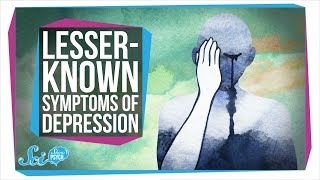Summarized are points from the clip above.
Many of us are familiar that depression can be associated with sadness and apathy. But people are less familiar with other symptoms that can be linked with depression such as irritability, anger, overwhelming guilt, experiences of memory loss. So much yet is still not fully understood about depression, especially at the cellular level. But the experience of it can vary tremendously. Here are some of the lesser known manifestations.
1.Self blame.
When something bad happens, depressed people can find it easy to blame themselves or even see it as a reflection of their self-worth as a whole. This pattern of thinking tends to only apply to themselves. In depression, individuals generally do not blame others in the same way. This pattern of thinking may come from two regions of the brain that don’t activate together the way they should. In a small study where the brains of approximately 20 people who had been depressed and another 20 who had not been were scanned, they were asked to read descriptions of themselves doing something wrong. In the study individuals, the passage activated both the part of the brain associated with guilt and a part that deals with morality and what is socially appropriate. In those who’d been depressed, the second part was not activated as strongly. Although this is a small sample size, there is suggestion that those with depression may struggle with getting an accurate picture of what was actually done wrong, so it is easier to just feel guilty in a more generalized manner.
2.Rumination
This is typically brooding, usually unintentionally. Part of problem solving involves analyzing the factors surrounding the problem. But rumination takes this way too far. It is getting stuck, thinking about everything that led to and resulted in a particular experience. This is strongly linked to both depression and anxiety. This can also be involved in the less straightforward symptoms of depression, such as memory compromise.
3.Memory compromise
Depressive disorders do affect cognition, the ability to understand, process, and respond to information. Among the many possibilities as to how depression can affect this, rumination can be involved as well. Excessive time spent ruminating can leave less cognitive reserve for more meaningful and higher yield tasks. In depression there can be struggles with episodic memory, the recollection of specific events and working memory, which is how you hold on to information while processing more information.
4.Anger and irritability
Rumination can also lead to this symptom. One reason being that it is hard to disengage from a particular line of thought which compromises cognitive function. Interestingly, this symptom can appear in more than half of patients. Although it is more commonly used to diagnose depressive disorders in children and teens. However, in some cases, it can be a sign of severe depression.
At the core, rumination can be seen as a strategy people have used to help cope with their emotions. It is just not a very good one. People find themselves brooding over something negative and as a result find themselves spending more time feeling negatively.
Now, there is some good news too. Self blame may have to do with brain regions not activating the way they should and rumination may feel like getting stuck. But research has shown that unhealthy thought patterns like these are the precise targets of psychotherapy, which when conducted well is found to be robustly effective and with no side effects. In addition, research has shown that psychotherapy can even promote therapeutic changes at the neuronal or cellular level. Cognitive behavioral therapy is the best studied therapy modality that is meant to identify certain thought patterns and behaviors and reshape them to lead to a better quality of life and help enforce more adaptive neuronal connection.

